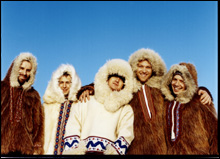
CRITICAL MASS: Mr. Beast marks one of the very few times in Mogwai’s history that the band are truly fond of their album.
|
“I think that what we do very naturally as a band is quite predictable,” says Mogwai guitarist and de facto leader Stuart Braithwaite over the phone, just weeks before the Scottish band embark on a US tour that has them headlining Avalon this Sunday, May 14. “Y’know, the whole quiet-loud, quiet-loud thing, maybe some of the sounds and parts, so we have to make an effort to do something different.” Since introducing themselves in 1997 as a primarily instrumental post-rock outfit with both the Young Team LP and Ten Rapid, a round-up of singles recorded and released over the previous two years, the Glasgow-based quintet — Braithwaite, guitarist John Cummings, bassist Dominic Aitchison, drummer Martin Bulloch, and pianist/guitarist Barry Burns — have indeed striven to evolve from the sprawling, explosive riff-and-feedback mayhem (typically set up or intersected by hypnotic, restrained passages) of those early works while maintaining their singular style. On 1999’s sparse, downcast Come On Die Young, the band mostly ditched the cacophony; on 2001’s Rock Action and 2003’s Happy Songs for Happy People (2003), they shortened and prettied up those explorations with billowy synthesizers, strings, and sporadic vocals, only rarely dipping back into the noise well.
So where to go on their fifth full-length album, Mr. Beast (released in the US, like the previous CDs, by Matador)? How, after a decade of operation, do Mogwai find new terrain to explore?
“I dunno, move our fingers a couple frets to the left?” Braithwaite offers, laughing before sidestepping artistic pretense and demystifying the band’s creative process. “You just keep trying things until it sounds good and it doesn’t sound exactly like the stuff we’ve done before.”
Mr. Beast isn’t a radical departure for Mogwai. It’s more of a distillation of the band’s biggest strengths — those deftly shifting dynamics, those moments of hushed, elegiac beauty, those explosions of what sound like 37 wall-rattling guitars. Each of the 10 tracks captures something essential about the band in a way they’ve never before managed in the studio. The way a stark piano takes the point for the intense, steadily advancing swell of guitars, electronic burbles, and tribal beat in “Auto Rock” makes for an ideal opener. The meshing of drum machines, vibraphone, lap steel, and vocals on the languid “Acid Food” creates a psychedelic, country-tinged soundscape. The glacial atmospherics of “Emergency Trap” outdream Sigur Rós; pulverizing guitar maelstroms swirl in “Glasgow Mega-Snake” and the final cut, “We’re No Here.”
“I think the only guideline we had for ourselves going in is that we wanted to have some more loud songs, because we’d kinda stopped doing that,” Braithwaite explains. “We still enjoyed playing all those old loud songs live but we didn’t really have very many new ones, and I think we all thought, ‘Come on, let’s try to do this, it’s not rocket science.’ ”
Yet as Burns adds, the general songwriting process remained the same. “No one comes in and says, ‘Hey, I’ve got this little piece of music.’ Someone just starts playing, and if anyone else starts playing along, then you know they like it. But if they just sit there and stare at you while you play for a while, then you just stop and know the idea is rubbish. We don’t really verbalize these kinds of things.”
One member of the Mogwai camp who’s done a lot of talking is manager Alan McGee, the founder of Britain’s revered, now defunct Creation Records. Last fall, after hearing a handful of the quintet’s rough demos, McGee proclaimed on his Web site that the in-progress disc was “probably the greatest art-rock record that I’ve been involved in since My Bloody Valentine’s Loveless. It’s possibly better than Loveless.”
“Ehh, Alan’s Alan,” Braithwaite chuckles. “It’s best to let him go on with these things, he’s just a walking quote machine. But he knows what he’s doing. He knew a lot of people would talk about it, so I think it created interest in the record. It probably made Alan seem a bit mad, but he’s happy to live with that tag. He just wanted people to know that he thought the songs were really good.”
That the band agree with that assessment would seem a given. Not in the world of Mogwai — this is one of the few times in their history that they’re truly fond of an album they’ve made. Braithwaite says that it’s only Mr. Beast and Happy Songs for Happy People that he regards affectionately. “The first one, and Rock Action, none of us were at all confident about ’em. Especially Young Team. We thought it was terrible, and it was a genuine surprise that people thought it was great. I mean, really, we thought it was a piece of shit. I just think we kind of got confronted by our own limitations a bit back then and it was really frustrating.”